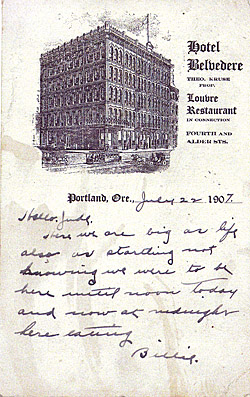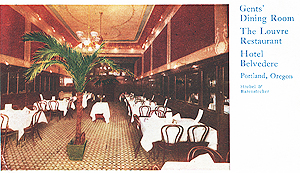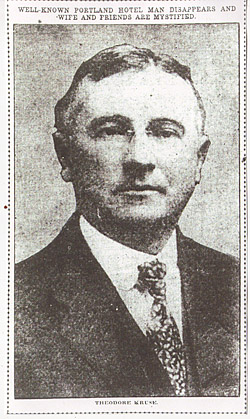The Louvre Restaurant
This article is a short summary of material covered in greater depth in George Painters book The Vice Clique, Portland's Great Sex Scandal, which was published in 2013. For more information about the book, including information on how to purchase it,
visit this link.
By George Painter, GLAPN Community Historian
 A preprinted postcard from the year Theodore Kruse bought the building. The message is from a woman calling herself "Billie" to a woman named Julia, but called "Jude."
A preprinted postcard from the year Theodore Kruse bought the building. The message is from a woman calling herself "Billie" to a woman named Julia, but called "Jude."
It may surprise people to know that there was a Gay‑owned and heavily Gay‑patronized restaurant in Portland a hundred years ago.
The Louvre was an elegant restaurant located in the Hotel Belvedere on the northeast corner of Fourth and Alder. Built in 1891, the Belvedere survived the massive flood of 1894 and was purchased in 1907 by property developer Theodore Kruse. Once he owned the restaurant, Kruse turned it into a “bohemian” place.
Separate restaurants were located inside, one for mixed male‑female dining and one for men only. (It isn’t known if there was one for women only as well.) The “Gents’ Dining Room” looked different from that of the mixed dining room. The men‑only dining room sported potted palms and mirror‑lined walls.
The Louvre became infamous in certain legal circles. It possessed a liquor license, and there a number of reports in local newspapers cited liquor law violations. In one from 1908, the Louvre found itself on a list of eight “gay refectories” where the “gay laugh” could be heard. Local judge William Gatens singled out the Louvre for criticism of its immoral atmosphere in 1911. In a 1912 article, the Louvre was referred to as a “flagrant” violator of liquor laws. Nevertheless, the place kept its license to sell.
 As early as 1909, the Louvre became a recurring venue for Hungarian violinist Jancsi Rigo, better known as “Gypsy” Rigo. Reviewers called Rigo’s music “hypnotic” and “delicately sensual.” In the fall of 1912, Rigo traveled from Paris to Portland for what turned out to be his final appearance in the city. On November 16, 1912, a Saturday, Rigo did not play at the Louvre as had been advertised in the newspaper. He, like a number of other men in Portland, had been arrested in the Vice Clique Scandal.
As early as 1909, the Louvre became a recurring venue for Hungarian violinist Jancsi Rigo, better known as “Gypsy” Rigo. Reviewers called Rigo’s music “hypnotic” and “delicately sensual.” In the fall of 1912, Rigo traveled from Paris to Portland for what turned out to be his final appearance in the city. On November 16, 1912, a Saturday, Rigo did not play at the Louvre as had been advertised in the newspaper. He, like a number of other men in Portland, had been arrested in the Vice Clique Scandal.
In the Vice Clique Scandal trials of 1912 and 1913, the Louvre was mentioned as a frequent meeting place for Gay men. It was shortly after this scandal that Kruse closed the Louvre. The Hotel Belvedere, its home, since has been torn down and a parking garage with first‑floor commercial space now occupies the site.
 Theodore Kruse as he looked at the time of his mysterious, but temporary, disappearance from Portland.
Theodore Kruse as he looked at the time of his mysterious, but temporary, disappearance from Portland.
Additionally, owner Theodore Kruse added some lavender allure of his own to the restaurant. In the summer of 1911, he disappeared. His wife tried to locate him on her own, then went public in desperation. When someone suggested he might have a secret mistress, Mrs. Kruse responded, for publication, “I never knew of his having associated with another woman. I laugh at such a suggestion because I had virtually to drive him out with the young men of his acquaintance to attend banquets or other social affairs.” The news of the prominent businessman’s disappearance was picked up by wire services, and Mr. Kruse later was spotted in Seattle “accompanied by a tall, slender young man” and a “heavy‑set man.” Local news about Kruse’s whereabouts trickled away until the following early spring when he made a sudden reappearance in Portland. He claimed he had been in Germany visiting his father. Shortly after his return, the Kruses were divorced.
Kruse tried his hand at another spectacular night spot, the Rainbow Grill, opened in 1915 in the Morgan Building. Prisms throughout the interior cast spectrums of color continuously throughout the restaurant, giving it an ethereal, other‑worldly appearance that drew raves from one newspaper reviewer. However, by summertime, Kruse filed for bankruptcy. The Louvre had been financially successful, but the Rainbow hadn’t.
After Oregon adopted a statewide prohibition law in 1916, Kruse moved to San Francisco. However, he returned to Oregon and lived on the Coast in Gearhart, where he died in 1941.
This article is a short summary of material covered in greater depth in George Painters book The Vice Clique, Portland's Great Sex Scandal, which was published in 2013. For more information about the book, including information on how to purchase it, visit this link.
P.O. Box 3646 • Portland, OR 97208-3646 • info@glapn.or
Copyright © 2015, Gay & Lesbian Archives of the Pacific Northwest

